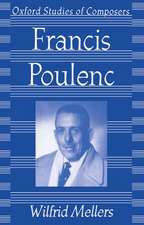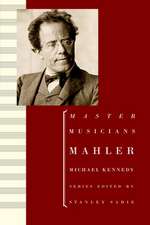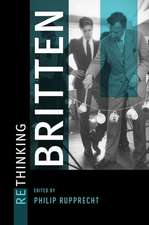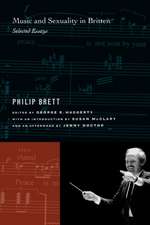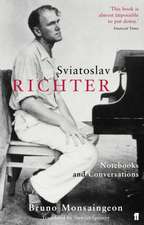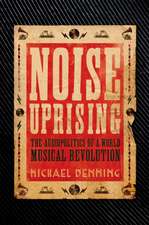John Cage: Composed in America
Editat de Professor Marjorie Perloff, Charles Junkermanen Limba Engleză Paperback – aug 1994
When the great avant-gardist John Cage died, just short of his eightieth birthday in 1992, he was already the subject of dozens of interviews, memoirs, and discussions of his contribution to music, music theory, and performance practice. But Cage never thought of himself as only (or even primarily) a composer; he was a poet, a visual artist, a philosophical thinker, and an important cultural critic.
John Cage: Composed in America is the first book-length work to address the "other" John Cage, a revisionist treatment of the way Cage himself has composed and been "composed" in America. Cage, as these original essays testify, is a contradictory figure. A disciple of Duchamp and Schoenberg, Satie and Joyce, he created compositions that undercut some of these artists' central principles and then attributed his own compositional theories to their "tradition." An American in the Emerson-Thoreau mold, he paradoxically won his biggest audience in Europe. A freewheeling, Californian artist, Cage was committed to a severe work ethic and a firm discipline, especially the discipline of Zen Buddhism.
Following the text of Cage's lecture-poem "Overpopulation and Art," delivered at Stanford shortly before his death and published here for the first time, ten critics respond to the challenge of the complexity and contradiction exhibited in his varied work. In keeping with Cage's own interdisciplinarity, the critics approach that work from a variety of disciplines: philosophy (Daniel Herwitz, Gerald L. Bruns), biography and cultural history (Thomas S. Hines), game and chaos theory (N. Katherine Hayles), music culture (Jann Pasler), opera history (Herbert Lindenberger), literary and art criticism (Marjorie Perloff), cultural poetics (Gordana P. Crnkovic, Charles Junkerman), and poetic practice (Joan Retallack). But such labels are themselves confining: each of the essays sets up boundaries only to cross them at key points. The book thus represents, to use Cage's own phrase, a much needed "beginning with ideas."
John Cage: Composed in America is the first book-length work to address the "other" John Cage, a revisionist treatment of the way Cage himself has composed and been "composed" in America. Cage, as these original essays testify, is a contradictory figure. A disciple of Duchamp and Schoenberg, Satie and Joyce, he created compositions that undercut some of these artists' central principles and then attributed his own compositional theories to their "tradition." An American in the Emerson-Thoreau mold, he paradoxically won his biggest audience in Europe. A freewheeling, Californian artist, Cage was committed to a severe work ethic and a firm discipline, especially the discipline of Zen Buddhism.
Following the text of Cage's lecture-poem "Overpopulation and Art," delivered at Stanford shortly before his death and published here for the first time, ten critics respond to the challenge of the complexity and contradiction exhibited in his varied work. In keeping with Cage's own interdisciplinarity, the critics approach that work from a variety of disciplines: philosophy (Daniel Herwitz, Gerald L. Bruns), biography and cultural history (Thomas S. Hines), game and chaos theory (N. Katherine Hayles), music culture (Jann Pasler), opera history (Herbert Lindenberger), literary and art criticism (Marjorie Perloff), cultural poetics (Gordana P. Crnkovic, Charles Junkerman), and poetic practice (Joan Retallack). But such labels are themselves confining: each of the essays sets up boundaries only to cross them at key points. The book thus represents, to use Cage's own phrase, a much needed "beginning with ideas."
Preț: 262.76 lei
Nou
Puncte Express: 394
Preț estimativ în valută:
50.29€ • 52.30$ • 41.51£
50.29€ • 52.30$ • 41.51£
Carte tipărită la comandă
Livrare economică 14-28 aprilie
Preluare comenzi: 021 569.72.76
Specificații
ISBN-13: 9780226660578
ISBN-10: 0226660575
Pagini: 296
Ilustrații: 20 halftones
Dimensiuni: 168 x 200 x 20 mm
Greutate: 0.45 kg
Ediția:1
Editura: University of Chicago Press
Colecția University of Chicago Press
ISBN-10: 0226660575
Pagini: 296
Ilustrații: 20 halftones
Dimensiuni: 168 x 200 x 20 mm
Greutate: 0.45 kg
Ediția:1
Editura: University of Chicago Press
Colecția University of Chicago Press
Cuprins
Acknowledgments
List of Illustrations
Introduction - Marjorie Perloff and Charles Junkerman
Overpopulation and Art - John Cage
"nEw / foRms of living together": The Model of the Musicircus - Charles Junkerman
"Then Not Yet 'Cage'": The Los Angeles Years, 1912-1938 - Thomas S. Hines
"A duchamp unto my self": "Writing through" Marcel - Marjorie Perloff
Inventing a Tradition: Cage's "Composition in Retrospect" - Jann Pasler
Regulated Anarchy: The Europeras and the Aesthetics of Opera - Herbert Lindenberger
Utopian America and the Language of Silence - Gordana P. Crnkovic
John Cage's Approach to the Global - Daniel Herwitz
Poethics: John Cage and Stanley Cavell at the Crossroads of Ethical Theory - Gerald L. Bruns
Chance Operations: Cagean Paradox and Contemporary Science - N. Katherine Hayles
Poethics of a Complex Realism - Joan Retallack
Appendix
List of Contributors
Index
List of Illustrations
Introduction - Marjorie Perloff and Charles Junkerman
Overpopulation and Art - John Cage
"nEw / foRms of living together": The Model of the Musicircus - Charles Junkerman
"Then Not Yet 'Cage'": The Los Angeles Years, 1912-1938 - Thomas S. Hines
"A duchamp unto my self": "Writing through" Marcel - Marjorie Perloff
Inventing a Tradition: Cage's "Composition in Retrospect" - Jann Pasler
Regulated Anarchy: The Europeras and the Aesthetics of Opera - Herbert Lindenberger
Utopian America and the Language of Silence - Gordana P. Crnkovic
John Cage's Approach to the Global - Daniel Herwitz
Poethics: John Cage and Stanley Cavell at the Crossroads of Ethical Theory - Gerald L. Bruns
Chance Operations: Cagean Paradox and Contemporary Science - N. Katherine Hayles
Poethics of a Complex Realism - Joan Retallack
Appendix
List of Contributors
Index

